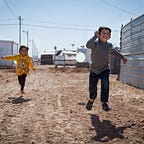Education as a Complementary Pathway to Resettlement
Academic scholarships have become a promising pathway for Syrian refugees to find protection in a humane and dignified way, while continuing their education in another country. Scholarship creation for refugees should be treated as a point of collaboration and responsibility sharing within the international community.
EDUCATION PATHWAYS
Education expands an individual’s knowledge and skill sets which allow people to join the workforce, contribute to their communities and become engaged citizens. Thus, the failure to provide learning opportunities for displaced persons can lead to profound consequences for both individuals and nations. While the 2030 Agenda on Sustainable Development recognizes that quality education, including higher education, plays a critical role for sustainable, peaceful development, education is often one of the first services suspended during conflict and one of the last services resumed. Ongoing conflict in Syria has had a devastating effect on the education system. Schools have been damaged, destroyed or turned into shelters, and at least one-third of the education system personnel has been lost.
Globally, 264 million children and adolescents do not have the opportunity to enter or complete school, as according to UNICEF.
While over one-third of young people of university age are in tertiary education globally, only 1% of refugees reach university level. Expanding access to higher education means creating opportunities for refugee students to equip themselves with the tools to become self-reliant while building towards their aspirations for the future. Academic scholarships are wide-ranging. They encompass short-term but secure scholarship opportunities which support refugee students to continue their education with the intent to eventually return to their home country and contribute to post-conflict reconstruction, as well as long-term scholarships which enable opportunities for refugees to integrate within their host community.
COLLABORATION WITHIN THE INTERNATIONAL COMMUNITY
The need for Syrian refugees to access to educational opportunities can be a point of collaboration and co-creation within the international community to share responsibility with countries who are hosting the largest number of refugees. While individual higher education institutions and civil society organizations have mostly taken the lead on expanding educational opportunities to refugees, further partnerships can still be forged. Establishing scholarship programs for refugees calls for the leveraging of resources and effective coordination from higher education institutions, private sector partners, NGOs, international organizations, and governments. Educational programs created must be adaptable to the educational challenges of refugee students and there is existing guidance from the UNHCR to ensure key minimum protection safeguards for scholarship programs, such as providing assistance and support to obtain valid travel documentation. More information regarding the key minimum protection safeguards can be found here.
SPARK SYRIA SCHOLARSHIP PROGRAM
SPARK is a non-profit organization which partners with approximately 18 higher education institutions to create their Higher Education Services project which tackles the overwhelming need to improve youth access to higher education in Syria. SPARK’s Higher Education Services project covers the course fees of Syrian and Syrian-Palestinian students with Equivalent Certificates from the Ministries of Education in their current countries of residence, which can include Turkey, Lebanon, and Jordan. The focus is to enroll refugees in higher education within the region, which can range from language courses to full-time vocational or academic education. The Higher Education Services project is a partnership aimed at contributing to the career prospects of Syrian refugees, by providing opportunity to further their education within neighboring countries and build community cohesion. Find out more about the SPARK Syria Scholarship Program here.
ALBERT EINSTEIN GERMAN ACADEMIC REFUGEE INITIATIVE (DAFI)
UNHCR provides, on a limited basis, scholarships for refugees at the undergraduate level at universities and polytechnic institutions through the Albert Einstein German Academic Refugee Initiative Fund (DAFI). DAFI began in 1992 and has since sponsored over 8,000 refugee students, inclduing Syrian refugee students, to attend university in approximately 40 countries. Scholarships are made available through partnerships that UNHCR has established with higher education institutions, the ministires of education, and other government officials within host countries. The DAFI program remains an integral contribution towards enabling displaced students worldwide to access higher education with scholarships covering a wide range of costs including tuition and fees, transportation, accommodation and allowances. Find out more about the DAFI scholarship program here.
The SPARK Syria and DAFI scholarship programs both represent the expansive possibilities that come to be when stakeholders collaborate for the common purpose of expanding access to higher education to Syrian refugees. While these two individual programs cannot fill the higher education gap for Syrian refugees completely, they do showcase the ability for the international community to create innovative partnerships to expand access to higher education for displaced communities. Refugee Pathways urges academic institutions to offer comprehensive scholarship opportunties for refugee students.
Emily Ervin, Refugee Pathways
